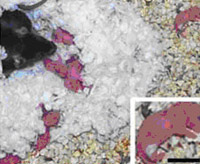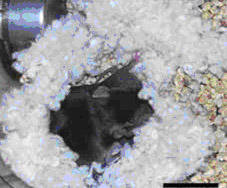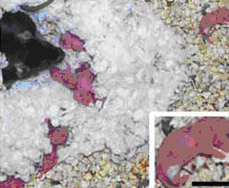Science Update
August 29, 2008
Serotonin Neurons Critical for Mouse Postpartum Maternal Behavior, Pup Survival
 Serotonin neuron-deficient
Serotonin neuron-deficient
mothers falter at nest breeding
Mood disorders, including postpartum depression, have long been treated with antidepressants that enhance the mood-regulating brain chemical messenger serotonin. Now, NIMH-supported researchers have demonstrated in mice - for the first time - that critical postpartum mothering behaviors and offspring survival also depend on proper functioning of serotonin-secreting neurons.
Mouse mothers genetically bred to have impaired brain serotonin neurons failed to build proper nests and to keep their pups warm in huddles, resulting in their succumbing to exposure. Female mice whose serotonin systems were partially restored early in brain development showed improved mothering behaviors as adults, suggesting that even subtle serotonin enhancements during critical growth periods can likely improve outcomes for future offspring.
"Despite the prevalence of postpartum depression and the frequent use of serotonin selective reuptake inhibitor antidepressants to treat this disorder, our findings are the first to directly demonstrate an important role for the serotonin system in reproductive success" said NIMH grantee Evan Deneris, of Case Western Reserve University. Deneris and colleagues report their findings in the September 2008 Nature Neuroscience.1
Deneris and colleagues had previously shown that mice genetically engineered to lack a key gene expression factor called Pet-1 fail to properly develop serotonin neurons and as adults are usually highly aggressive and anxious.2 However, the mouse mothers in the current study displayed little anxiety, consistent with known effects of being in a lactating state.
Control mouse mothers huddled their offspring in tidy nests for warmth, while mothers deficient in serotonin neurons ignored scattered pups tossing and turning amid disheveled bedding material. Unlike these animals, pups rescued from serotonin-deficient mothers on the first day after birth and nurtured by normal control mothers survived.
Next, the investigators used a genetic cousin of Pet-1 to engineer strains of partially "rescued" mice with serotonin systems functioning at levels in between those of normal control mice and the Pet-1 gene knockout mice. These animals showed an intermediate level of maternal care and their offspring survival rates were in between those of control and the Pet-1 knockout strains.
Since serotonin is probably required during the early postnatal period for the normal maturation of circuitry governing emotional behaviors, the abnormal nurturing shown by Pet-1- deficient mouse mothers could be the result of defective circuitry governing maternal motivation and reward, say the researchers.
Mouse Postpartum Maternal Behavior
Controls
|
Serotonin-Deficient
|
Source: Evan Deneris, Ph.D., Case Western Reserve University
Control mouse mothers built proper nests and huddled their pups to keep them warm (left). Mouse mothers experimentally bred with impaired brain serotonin systems faltered at nest-building and allowed pups to scatter and succumb to exposure (right).
References
1Lerch-Haner JK, Frierson D, Crawford LK, Beck SG, Deneris ES. Serotonergic transcriptional programming determines maternal behavior and offspring survival. Nat Neurosci. 2008 Aug 17. [Epub ahead of print] PMID: 18711398
2Hendricks TJ, Fyodorov DV, Wegman LJ, Lelutiu NB, Pehek EA, Yamamoto B, Silver J, Weeber EJ, Sweatt JD, Deneris ES. Pet-1 ETS gene plays a critical role in 5-HT neuron development and is required for normal anxiety-like and aggressive behavior. Neuron. 2003 Jan 23;37(2):233-47. PMID: 12546819
